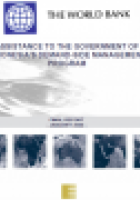Publications
The energy situation in Indonesia is changing rapidly. High and fast international oil energy price increases had to be dealt with to ease the pressure on the national economy. In the meantime, electricity tariffs subsidy had to decrease significantly to prepare the ground for electricity sector restructuring. In addition, Indonesia shows the highest energy intensity level in the sub-region, indicating that potential significant energy savings may exist in several economical sectors.. One option to deal with this new energy situation was clearly to promote actively DSM initiatives and programs so to limit at customer’s level the potential negative impact of energy price hike. In this context, this report was produced to develop a strategy assisting the government of Indonesia to enhance its Demand-Side Management Program.
World Bank. Assistance to the Government of Indonesia's Demand-Side Management Program, Final Report. 2006. Washington, DC: World Bank.
